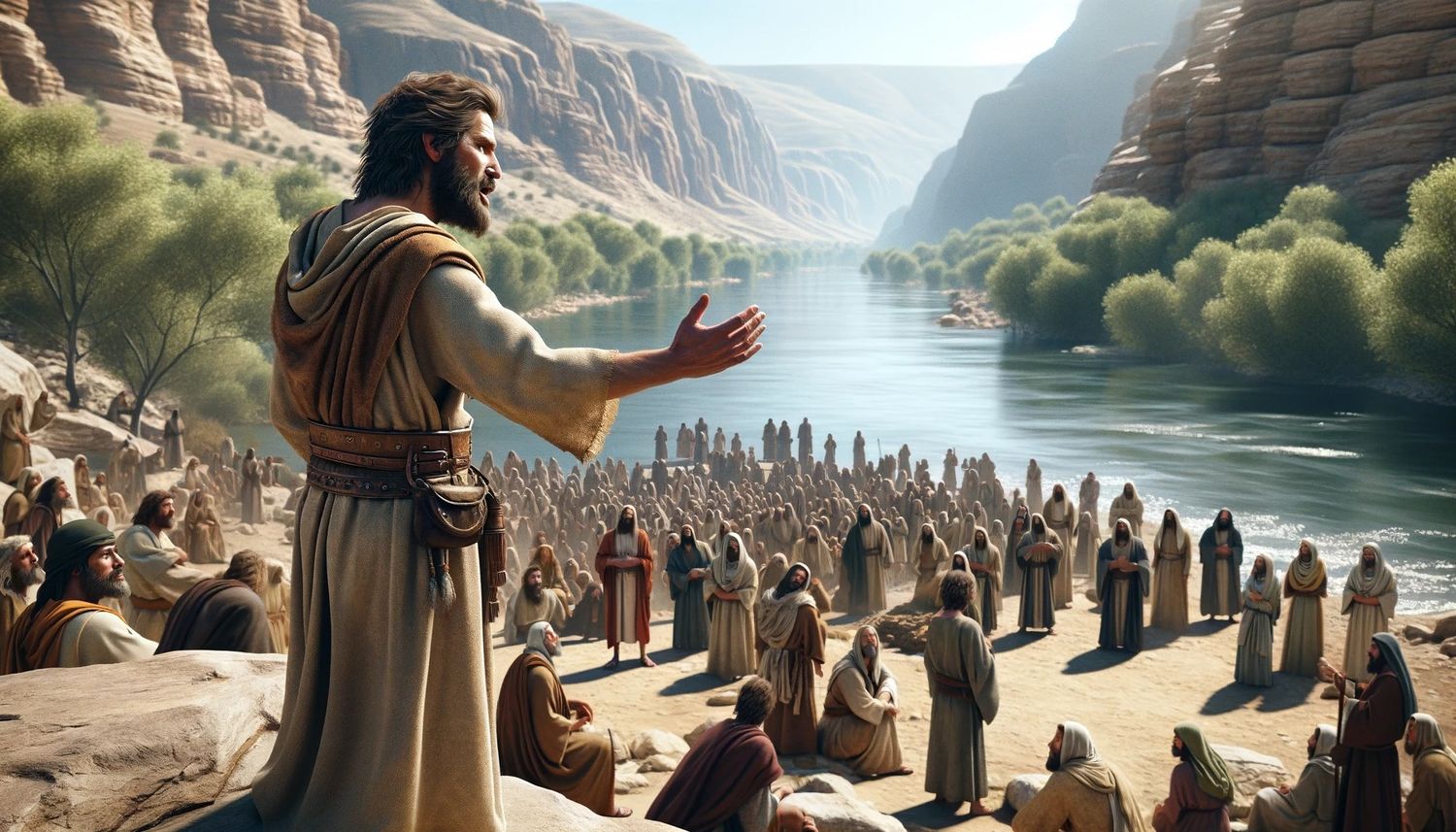Home>Christian Videos>Bible Stories>Why Did John The Baptist Say He Didnt Know Jesus


Bible Stories
Why Did John The Baptist Say He Didnt Know Jesus
Published: March 6, 2024
Peter Smith, Editorial Director at Christian.net, combines deep insights into faith, politics, and culture to lead content creation that resonates widely. Awarded for his contributions to religious discourse, he previously headed a major organization for religious communicators, enhancing dialogue on faith's societal impacts.
Discover why John the Baptist claimed not to know Jesus in this intriguing exploration of Bible stories. Uncover the significance of this statement and its impact on their relationship.
(Many of the links in this article redirect to a specific reviewed product. Your purchase of these products through affiliate links helps to generate commission for Christian.net, at no extra cost. Learn more)
Table of Contents
The Background of John the Baptist
John the Baptist was a significant figure in the New Testament, known for his role as a precursor to Jesus Christ. He was born to Zechariah, a priest, and Elizabeth, who was a relative of Mary, the mother of Jesus. John's birth was miraculous, as his parents were elderly and had been unable to conceive. John's purpose was to prepare the way for the coming of the Messiah, and he did so by preaching repentance and baptizing people in the Jordan River. His clothing made of camel's hair and his diet of locusts and wild honey reflected his ascetic lifestyle. John's ministry attracted large crowds, and he gained a reputation as a powerful and influential preacher. His message of repentance and the imminent arrival of the Messiah resonated with many, setting the stage for the eventual appearance of Jesus Christ.
The Relationship Between John the Baptist and Jesus
-
Cousins: John the Baptist and Jesus were cousins, as their mothers, Elizabeth and Mary, were related. This familial connection underscores the close bond between the two figures and sets the stage for their intertwined destinies.
-
Baptism: John the Baptist baptized Jesus in the Jordan River, marking the beginning of Jesus' public ministry. This event symbolized the passing of the mantle from John to Jesus and signified the start of a new era in the spiritual landscape.
-
Recognition: John recognized Jesus as the Messiah, referring to him as the "Lamb of God" and acknowledging his divine role. This acknowledgment highlights John's understanding of Jesus' significance and his willingness to fulfill his own prophesied mission of preparing the way for the Savior.
-
Respect: Jesus held John the Baptist in high regard, referring to him as a prophet and praising his dedication to God's work. This mutual respect between the two figures emphasizes the unity of their purpose and the shared commitment to fulfilling their respective roles in the divine plan.
-
Influence: John's ministry and message had a profound impact on Jesus, shaping his understanding of his own mission and the nature of his relationship with God. The teachings and baptism administered by John served as foundational elements in Jesus' spiritual journey and the development of his teachings.
-
Continuity: Despite their distinct roles, John the Baptist and Jesus shared a common message of repentance, righteousness, and the coming of the kingdom of God. Their parallel themes and complementary missions underscore the interconnectedness of their work and the seamless transition from John's ministry to the emergence of Jesus as the central figure in the Christian narrative.
The Context of John's Statement
John the Baptist's statement, "I didn't know Jesus," must be understood within the context of his ministry and the unfolding narrative of the New Testament. This declaration occurs in the Gospel of John, where the Baptist clarifies his relationship with Jesus in response to the religious leaders' inquiries. The context of John's statement encompasses several key elements that shed light on its significance:
-
Religious Inquiry: The religious leaders questioned John about his identity and whether he was the Messiah, Elijah, or the Prophet. In response, John explicitly stated that he was not the Christ, Elijah, or the Prophet, emphasizing his humility and self-awareness of his role in the divine plan.
-
Pointing to Jesus: John's declaration about not knowing Jesus serves to redirect attention from himself to the one who comes after him. By distancing himself from the spotlight and acknowledging his subordinate position, John highlights the preeminence of Jesus and the fulfillment of the Messianic prophecy.
-
Transition of Authority: As the forerunner of Jesus, John understood the transition of authority and significance from his own ministry to the arrival of the Messiah. His statement underscores the passing of the torch and the recognition of Jesus as the central figure in God's redemptive plan.
-
Humility and Obedience: John's assertion reflects his humility and obedience to God's design. By disclaiming personal acquaintance with Jesus, he exemplifies a humble posture and a willingness to fulfill his designated role without seeking personal acclaim or recognition.
-
Theological Significance: Within the broader theological framework, John's statement aligns with the overarching theme of humility, servanthood, and the exaltation of Christ. It reinforces the narrative of John's preparatory ministry and the seamless transition to the manifestation of Jesus as the focal point of salvation history.
-
Clarification of Roles: John's words serve to clarify the distinct roles of himself and Jesus, delineating the boundaries of their respective missions while emphasizing the interconnectedness of their divine callings. This clarification contributes to a deeper understanding of the complementary nature of their ministries and the fulfillment of prophetic promises.
In essence, the context of John's statement illuminates the underlying themes of humility, obedience, and the orderly progression of God's redemptive plan. It underscores the pivotal role of John the Baptist as the herald of Christ and the deliberate redirection of attention to the long-awaited Messiah, Jesus of Nazareth.
The Possible Reasons for John's Statement
-
Divine Revelation: John the Baptist's statement may stem from a profound sense of divine revelation regarding Jesus' identity and mission. As a prophet chosen by God to prepare the way for the Messiah, John's declaration of not knowing Jesus could signify his recognition of Jesus' transcendent nature and the divine origin of his mission. This revelation may have prompted John to acknowledge the incomparable nature of Jesus' role in the unfolding of God's redemptive plan, leading him to distance himself in deference to the exalted status of the Savior.
-
Humility and Servanthood: John's statement likely reflects his deep humility and commitment to a servant-leadership ethos. By disavowing personal acquaintance with Jesus, John exemplifies a humble posture that prioritizes the exaltation of Christ over self-promotion. His willingness to diminish his own prominence in favor of magnifying Jesus underscores the foundational principles of humility and servanthood, which are central to the Christian ethos and the embodiment of Christ-like virtues.
-
Fulfillment of Prophecy: John the Baptist's assertion may align with the fulfillment of prophetic expectations regarding the Messiah. In the prophetic tradition, the forerunner's role was to prepare the way for the coming of the Anointed One, and John's statement could signify the fulfillment of this preparatory function. By emphasizing his lack of prior acquaintance with Jesus, John underscores the fulfillment of the prophetic anticipation of the Messiah's arrival, thereby affirming the continuity of God's redemptive plan as foretold in the scriptures.
-
Distinctive Missions: Another possible reason for John's statement lies in the distinction between his prophetic mission and that of Jesus. As the herald of the Messiah, John recognized the unique nature of his own calling as the preparer of the way, distinct from the redemptive mission that Jesus would fulfill. His declaration of not knowing Jesus may serve to delineate the boundaries of their respective roles, emphasizing the complementary nature of their ministries while underscoring the preeminence of Jesus as the central figure in the divine drama of salvation.
-
Spiritual Discernment: John's statement may also reflect his spiritual discernment and insight into the unfolding of God's plan. Through his intimate connection with the divine purpose, John may have discerned the significance of Jesus' mission and the unparalleled impact it would have on humanity. His declaration of not knowing Jesus could thus signify a deep spiritual understanding of the transformative role that Jesus would play in the redemption of humanity, thereby prompting John to position himself in deference to the unfolding divine agenda.
-
Preemptive Clarification: John's statement might serve as a preemptive clarification to prevent any misconceptions or misperceptions about his relationship with Jesus. By explicitly stating that he did not know Jesus, John could have sought to dispel any potential confusion regarding their association, thereby ensuring a clear delineation between their respective roles and identities. This preemptive clarification underscores John's commitment to transparency and the avoidance of any misinterpretation that could detract from the central message of Jesus' redemptive mission.
In essence, John the Baptist's statement likely emanated from a combination of divine revelation, humility, prophetic fulfillment, discernment, and the delineation of distinctive roles, all of which underscore the profound theological and spiritual dimensions of his declaration.
The Theological Implications of John's Statement
John the Baptist's statement, "I didn't know Jesus," carries profound theological implications that resonate throughout the Christian narrative and the broader theological landscape. This declaration, situated within the context of John's ministry and the advent of Jesus as the Messiah, engenders several theological implications that enrich the understanding of God's redemptive plan and the significance of Christ's salvific mission.
Read more: How Did John The Baptist Know Who Jesus Was
1. Humility and Subordination
John's statement exemplifies a profound sense of humility and subordination to the divine order. By disclaiming personal acquaintance with Jesus, John underscores the humility inherent in his role as the forerunner and the willingness to yield the spotlight to the exalted figure of Jesus. This theological implication emphasizes the virtue of humility as a foundational element in the Christian ethos and underscores the principle of subordinating personal prominence to the exaltation of Christ.
2. Recognition of Jesus' Uniqueness
The Baptist's declaration underscores the unparalleled uniqueness of Jesus' identity and mission. By distancing himself from personal familiarity with Jesus, John accentuates the incomparable nature of the Messiah's role in the divine plan of salvation. This theological implication highlights the exceptional status of Jesus as the central figure in God's redemptive agenda and reinforces the theological understanding of Christ's singular position as the Savior and Redeemer of humanity.
3. Fulfillment of Prophetic Expectations
John's statement aligns with the fulfillment of prophetic expectations regarding the forerunner and the Messiah. In the prophetic tradition, the preparatory role of the forerunner was intricately linked to the arrival of the Anointed One, and John's declaration signifies the realization of this prophetic anticipation. This theological implication underscores the continuity of God's redemptive plan as foretold in the scriptures and affirms the fulfillment of ancient prophecies in the person of Jesus Christ.
4. Servant Leadership and Redemptive Purpose
The Baptist's assertion embodies the principles of servant leadership and redemptive purpose. By prioritizing the exaltation of Christ over personal recognition, John exemplifies the servant-leader ethos that characterizes the Christian paradigm. This theological implication emphasizes the sacrificial nature of John's ministry and the overarching redemptive purpose that culminates in the redemptive work of Jesus, thereby illuminating the interconnectedness of their respective roles in God's salvific plan.
5. Theological Continuity and Transition
John's statement signifies the theological continuity and transition from the preparatory ministry of the Baptist to the manifestation of Jesus as the central figure in the Christian narrative. This theological implication underscores the seamless progression of God's redemptive plan, wherein the preparatory phase led by John gives way to the definitive revelation of Jesus as the fulfillment of divine promises. It highlights the interconnectedness of their ministries and the deliberate transition from the herald to the heralded, thereby enriching the theological understanding of God's unfolding narrative of salvation.
In essence, the theological implications of John the Baptist's statement, "I didn't know Jesus," reverberate with themes of humility, recognition of Jesus' uniqueness, prophetic fulfillment, servant leadership, and theological continuity, all of which contribute to a deeper understanding of the divine drama of redemption and the central role of Jesus Christ in the fulfillment of God's redemptive purposes.













